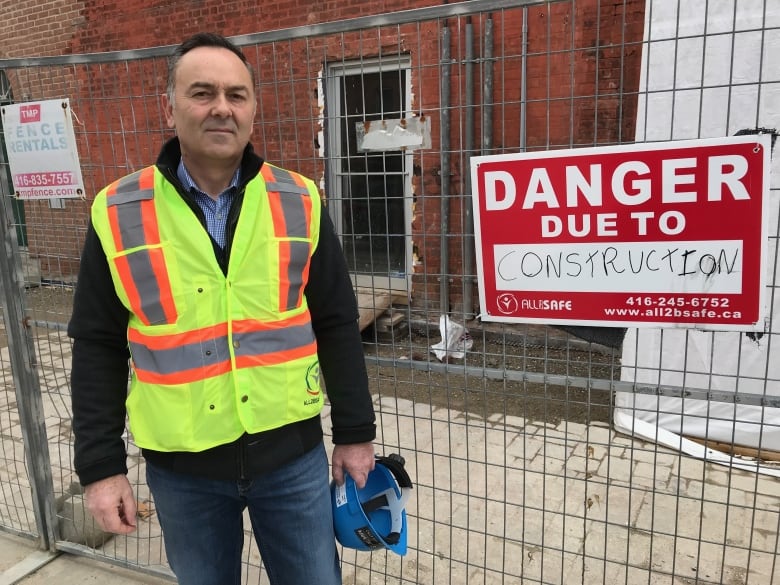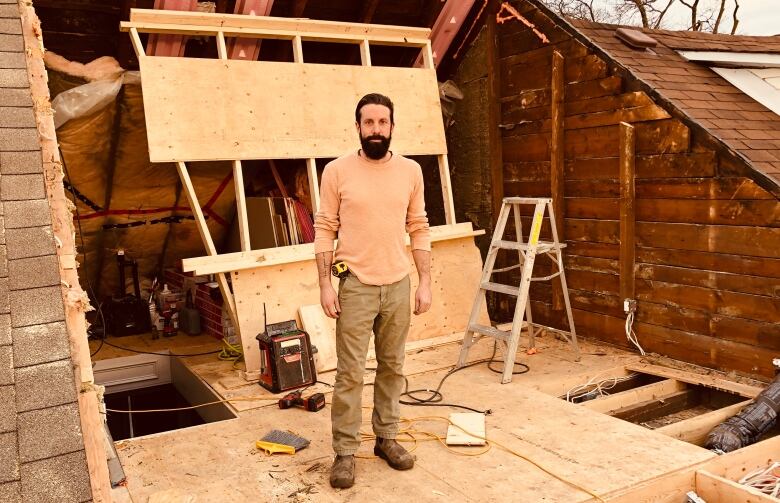In Ontario, construction is an essential service, but some workers fear COVID-19 puts them at risk
Some call for broad industry shutdown like the one in Quebec

Construction is on Ontario's list of essential services that can keep operating during the COVID-19 pandemic, but there are growing calls within the sector for a broad industry shutdown, such as the one Quebec instituted this week.
Ontario workers on large job sites, unions and contractors who do smaller-scale residential and commercial projects are among the voices saying the province's definition of essential construction activities is too broad — putting workers and the public at risk.
The construction work allowed under the list of essential services the province released this week includes transit projects, health-care facilities and basically everything else. The list allows "construction and work services, including demolition services, in the industrial, commercial, institutional and residential sectors."
"If it's a hospital, you know, and medical facilities that we desperately needed, fine. I'm all for it," said Antonio Cruz, a Toronto-based general contractor and project manager. "But residential, especially residential, it makes no sense."
While saws keep buzzing and hammers keep swinging in Ontario, that's not the case in Quebec, which has the country's strictest lockdowns.
It shut down almost all businesses, including those employing its 250,000 construction labourers, and in doing so, prompted a debate about which construction jobs really are essential.
'Shelter is at the top of the list': Premier Ford
"When it comes to the necessities of life, shelter is at the top of the list," Ontario Premier Doug Ford said of his government's decision to keep residential construction going.
Shelter is, indeed, high in the hierarchy of needs, but some in Ontario's construction industry are nevertheless shutting down their residential building operations as the coronavirus pandemic spreads across the province and the country.
Mattamy Homes temporarily suspended work at all its construction sites and sales offices as builders around the province assess the situation.

In Toronto, Cruz's Greenfield Enterprises has shut down construction on a commercial project converting a former restaurant space into a bank.
His company also shut down three custom-built home projects in the city, the first at the request of the client, who wanted the work stopped to protect workers on the job.
Cruz, who also has a health safety consulting business, said hygiene on construction sites was a serious problem even before the pandemic.
For him, there's too much at stake to justify keeping infrastructure projects going, particularly in an industry where delays are already common.
"Do we have to kill people just because we gotta open the subway?" said Cruz. "I mean, we've lived for the last 50 years with the subway lines we have."
Unions raising red flag as workers keep going
The Carpenters' Union and the International Union of Painters and Allied Trades, which represent about 35,000 workers combined, are calling on Ontario to shut down the construction industry because of COVID-19.
Both unions are giving their members safety tips, and the website of the former includes instructions for members who want to stop working on how to collect vacation pay.
The Ontario chapter of the Labourers' International Union of North America, which represents 90,000 members, is not calling for a shutdown, but union leader Jack Oliveira wrote a pointed letter to the province's Ministry of Labour.
In it, he demanded more frequent visits by health and safety inspectors.
He also passed on a number of concerns from union members, including one employer telling workers to bring their own protective equipment to the job and gathering up masks and locking them away.
Bradley Metlin, press secretary for the ministry, told CBC News that Ontario's government is in close contact with labour leaders and industry executives. Some companies have said that they're committed to keeping their projects going and protecting their workers.
In a statement, Metlin said companies must "take every precaution reasonable in the circumstances to protect the health and safety of workers."
Provincial inspectors will investigate all health and safety concerns, "including those related to COVID-19 in a timely manner," he said.
Building controversy
As work goes on, so does the controversy around it.
A video of a Toronto construction worker complaining about working conditions circulated on social media Wednesday.
In it, the man tells a crowd of co-workers "I've got an 86-year-old at home … My wife is crying every time I go home because she doesn't know [if] I'm going to kill her father if I have something."
An online petition to halt construction in Ontario has racked up more than 41,000 signatures, some accompanied by strongly worded comments.
"The government is trying to say that construction workers are the peasants of the industry," wrote Victor Z.
"That's why they won't shut us down. We are the slaves. They will never let us stop."
WATCH | Flattening the curve: How to slow down spread of coronavirus:
Construction workers sacrificing their health and safety for the benefit of developers was a concern raised in a recent New York Times article about the ongoing building in the city, amid its own coronavirus lockdown.
Many comments in the Ontario online petition highlighted work site conditions.
Diana Marques of Toronto said the same rationale for shutting down schools should apply to construction sites because of the large number of people sharing the same space.
"My husband is exposed every day to well over 50 people," she said.
"He has to share a hoist with at least 20 different trades. The exposure to sharing a hoist alone is dangerous to health and well-being and not to mention they have no proper handwashing stations."
Some have it better
Some workers in the Toronto area have better conditions than others but are still concerned.
Anthony Paglia is one of about 15 electricians at Musico Electric — all still working. The firm does commercial, industrial and residential jobs.

Paglia picks up his supplies daily at the company shop, so he doesn't need to visit stores. He said there have only been a small number of people on his job sites, well spread out, with hand sanitizer and masks provided.
He knows that's not the norm, and his boss has told him not to work if he's worried about where he's working or how many people are there. Paglia weighs his wage against the possibility of bringing the virus back to his family.
If I don't think the job site is safe, I probably won't go. I've refused unsafe work in the past.- Anthony Paglia, electrician at Musico Electric
"If I don't think the job site is safe, I probably won't go," he said. "I've refused unsafe work in the past."
Breaking the news to customers
The contractors who have put safety first and shut down their businesses for now because of COVID-19 have to explain their decision to clients who may have jobs that are incomplete or projects they are desperate to get done.
Chris Ashton and his brother run Ashton Renovations and work across the Greater Toronto Area. They decided to stop working on March 17, a week before Ontario's lockdown. The pair emailed their clients and put up a blog post explaining their position.
Still, some customers required phone calls.
"We had some clients who weren't processing it, like they're saying, 'Oh, we trust you. You know, we'll let you in the door still.'"
Ashton told them the coronavirus doesn't discriminate and can infect anyone.
"We had to put a foot down," he said.
'A safety issue'
Contractor Derek Meulendyks didn't have to let any clients down because he's been working on his own house in Toronto's Little Italy neighbourhood for several months.
He recently tore half of his roof off to create a new bedroom and is relieved not to be confronting the challenges of trades people on big sites.

He hopes the reality of COVID-19 will resonate with an industry that demands a certain grit from everybody it employs.
"You're just so used to putting your boots on and going to work no matter what — pain, difficult and dangerous things to do," Meulendyks said.
"It can be a difficult perspective for some of us to really see this for what it is, which is a safety issue, not just see it as something you got to tough out."



